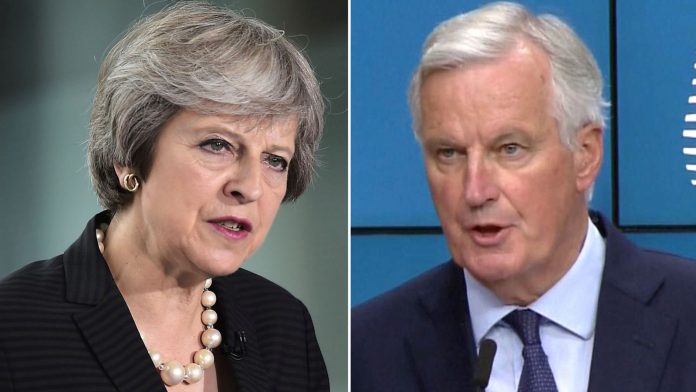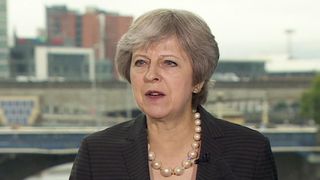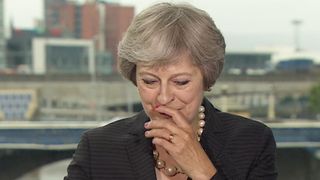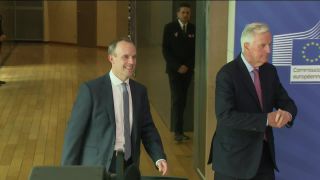[ad_1]
The EU’s chief negotiator has hinted Brussels is anticipating further changes to Theresa May’s Brexit blueprint, amid a febrile atmosphere within the prime minister’s party over her handling of Britain’s departure.
Giving the EU’s reaction to a recent white paper containing proposals for Britain’s future relationship with the bloc, Michel Barnier said the document “does open the way to a constructive discussion leading to the political declaration on our future relationship.”
He then said: “This white paper is the result of a very intense internal debate in the UK, a debate that was necessary and I think we have all seen that this debate in the UK is not over yet.”
The comments will be interpreted as a thinly-veiled signal that the EU is expecting more internal Tory turmoil over the terms of Britain’s EU exit.
Boris Johnson and David Davis resigned over Theresa May’s Brexit blueprint – agreed following a marathon day of talks at her country retreat of Chequers – plunging the government into crisis.
Mrs May managed to survive this double resignation – but then had to contend with a series of knife-edge votes on key Brexit legislation that saw the Brexiteer and Remainer wings of her party flex their muscles and voice their anger.
In a speech in Belfast on Friday, the PM called on the EU to “evolve” its Brexit position and warned its proposed solution to avoiding a hard border in Northern Ireland would be rejected by MPs.
Speaking in the hours after Mrs May’s address, Mr Barnier said there were many elements of her white paper that paved the way for constructive talks and were “very useful”, including:
:: “The proposal for a free trade agreement which will be at the very heart of our future economic relations;
:: “A commitment to a level playing field, especially as regards state aid and the rules on employment and the environment;
:: “A broad convergence on the absolute need to co-operate on both internal and external security;
:: “The guarantees that are going to be provided for defending fundamental rights and the recognition of the role to be played by the European Court of Justice (ECJ) as sole arbiter.”
Brexit Secretary Dominic Raab held talks with Mr Barnier on Thursday, the former’s first discussions in Brussels since he replaced Mr Davis.
Mr Barnier described the meeting as “very useful and very cordial” and said he had made clear to Mr Raab that Brussels did not want a border between Northern Ireland and the rest of the UK.
But he said Mrs May’s decision to leave the EU’s single market and customs union meant there would need to be checks on goods.
“We cannot afford to lose time on this issue and this is why we have invited the UK to work on the backstop next week,” he said.
“We are open to any solutions as long as they are workable and can be transformed into a legally operative text in time for the withdrawal agreement.”
Despite the positive noises from Mr Barnier, he said the white paper posed a number of questions that the EU would be seeking answers to.
In particular he raised concerns about whether Mrs May’s plan to sign Britain up to EU rules and regulations for goods, a “common rulebook”, were “workable”.
Mr Barnier said because this would mean rules on areas like pesticide use in the agro-food sector were not included, it raised issues of protecting European consumers.
He also raised questions about whether the proposals in the white paper were workable without more bureaucracy and voiced concerns about collecting tariffs.
In addition, Mr Barnier said the EU could find it difficult to avoid “unfair competition” from Britain if it agreed to the UK’s plan for it to diverge on services.
He told reporters in Brussels that further discussions would be needed to establish how much “common ground” exists between London and Brussels.
Speaking earlier, Mrs May described her white paper proposals as “a significant development of our position … a coherent package”.
She said: “It is now for the EU to respond – not simply to fall back on to previous positions which have already been proven unworkable, but to evolve their position in kind.”
Addressing this call, Mr Barnier said the EU had already been “creative and flexible” on the backstop – and that the issue needed to be “de-dramatised”.
He said there could be no withdrawal agreement without a backstop, but suggested there was further room for manoeuvre from the EU side.
“It’s not necessarily our backstop. We can work on this, amend it, improve our backstop – the one that the Commission proposed on behalf of the Union.
“Technically we feel that it’s workable, we can improve it further, we can work on it. We are doing that work.”
Emphasising the need for swift progress, Mr Barnier said there were only 13 weeks before a summit in October when the Withdrawal Agreement is set to be finalised, along with a political declaration on the post-Brexit UK/EU relationship.
He suggested that deadline could be moved into November, but that it cannot go beyond the start of December because the official date of Brexit (29 March 2019) has been enshrined in legislation.
[ad_2]











